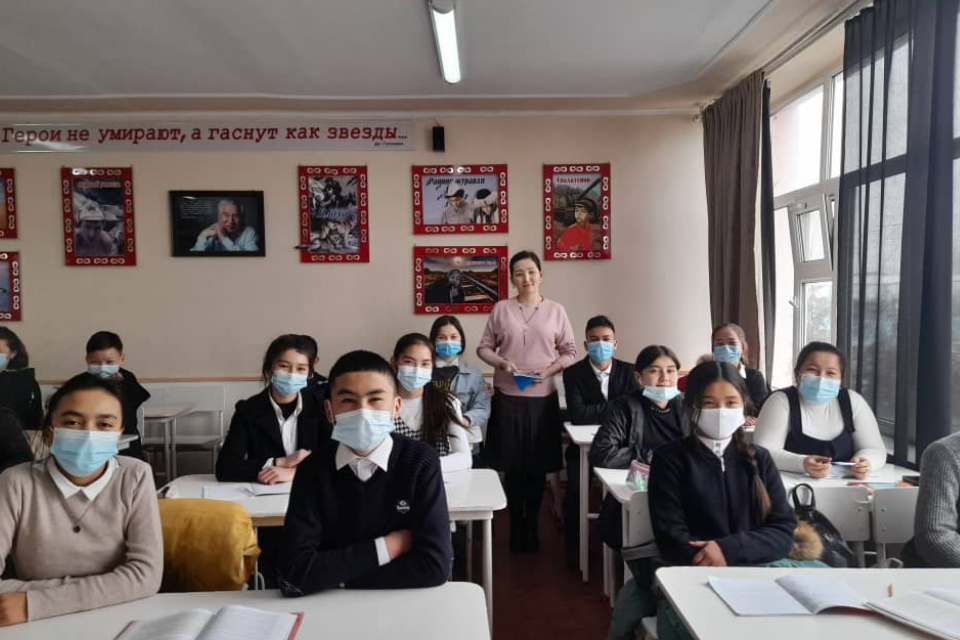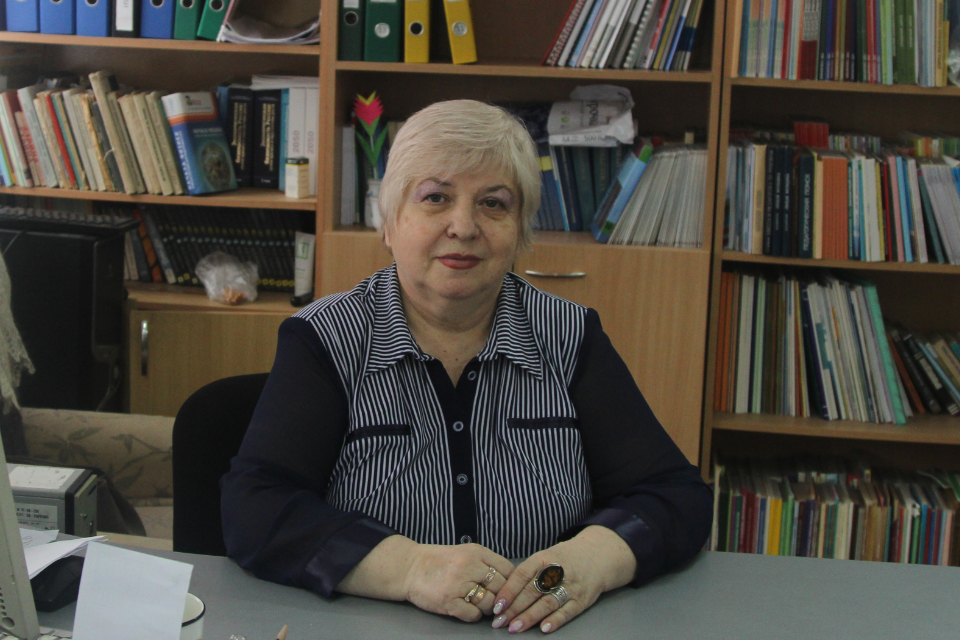TV and video lessons sharpen students’ civic competencies in Kyrgyzstan
Date:

At least 3,000 high school students across Kyrgyzstan have strengthened their knowledge of gender equality, non-discrimination and other civic issues thanks to a series of TV and video lessons piloted by UN Women and partners.
In light of the abrupt transition to online teaching brought on by the COVID-19 pandemic and as Kyrgyzstan’s Ministry of Education and Science ramped up efforts to introduce digital course contents, UN Women teamed up with the Foundation for Education Initiatives Support (FEIS) to develop and pilot five TV programmes and four video lessons for the “Human and Society” secondary school compulsory course.
Teachers of students in grades 9 through 11 from 33 schools in seven provinces across the country have used these video lessons and TV programmes as valuable teaching tools.
Among them is Aisuluu Pazylova, a teacher of the “Human and Society” course at the Krupskaya secondary school in Nookat. She notes that the learning format has been both useful and interesting for students, provoking their active participation in class discussions.
In particular, Pazylova valued the video lesson on “Building a family: The problem of ala-kachuu [bride kidnapping] and early marriages”, which depicts different ways of building a family, which ways are illegal and why, and helps students recognize the importance of freedom of choice and respect for human rights.
“The kids were active during the class, giving examples from the history of Kyrgyzstan that show that bride kidnapping is an illegal and distorted version of the old tradition, because it leads to coercion and violence,” she says. “They said that it is necessary to strictly suppress such illegal actions as bride kidnapping, which is a gross violation of girls’ rights.”
The lessons also cover topics including nationality, ethnicity and diversity, social roles and stereotypes, men and women in the labour market, as well as the need for equal rights and opportunities.
According to a UN Women Rapid Gender Assessment conducted in Kyrgyzstan in 2020, the closure of schools and other educational institutions for quarantines forced teachers to promptly switch to online teaching aids, although in many cases they did not have the necessary training, skills, or even basic technical equipment.

Elizaveta Shapovalova, who teaches the “Human and Society” course and is Deputy Director for Scientific and Methodological work at Secondary School #62 in Bishkek, highlights the importance of such audiovisual materials in forming civic competences.
“We watched the TV programme ‘Inclusive society’ for two days, actively discussed it, wrote an essay, and did a blindfolded experience. The students realized how important it is to help others and those who are in need,” she says.
Shapovalova believes that such video materials provide food for thought while stimulating students to think and reflect on given situations. The programme helps form the values of empathy and humanism, analyse ways of achieving social inclusion and makes the classroom environment more friendly and equitable.
The Ministry of Education and Science has added the video lessons, which are available in both Russian and the Kyrgyz language, to its database of educational resources.
Several teachers reported plans to use them as a complementary teaching tool in future lessons. Many also expressed interest in receiving similar video learning materials on civic competencies.
As UN Women Project Coordinator Anara Aitkurmanova notes, “civic education helps to build skills and form values by putting schoolchildren in real life situations where they can express and protect their opinions, thus developing critical thinking skills”.
These materials were produced under the “Communities for Sustainable Peace” joint project, which UN Women implements together with UNICEF and UNFPA, in partnership with the Kyrgyz Government and civil society organizations.
The full list of links for all 4 videos and all 5 TV programmes is:
Video lessons:
Building a family: the problem of ala-kachuu and early marriages https://youtu.be/NNox7d7wWxY (in Kyrgyz), https://youtu.be/ZGI237dwZKw (in Russian)
Man and woman on the labor market: https://youtu.be/u_IuWVirMCk (in Kyrgyz), https://youtu.be/-zml-hqjYzA (in Russian)
Citizenship, nationality and ethnicity: https://youtu.be/q-WRY0Xnq1s (in Kyrgyz), https://youtu.be/PzVme7snzDQ (in Russian)
How to find your calling? https://youtu.be/Iyl1_Ur-ZQc (in Kyrgyz), https://youtu.be/jD1QZu8ysJU (in Russian)
TV programmes:
Diversity in modern society: https://youtu.be/DCTOnUck2v0 (in Kyrgyz), https://youtu.be/GxMJq4qeyCg (in Russian)
Social roles and stereotypes: https://youtu.be/OagRgXEIlNQ (in Kyrgyz), https://youtu.be/UKsInWhQX2w (in Russian)
Modern inequality: https://youtu.be/cXeb6A4aBNk (in Kyrgyz), https://youtu.be/rN9_WuwXPb8 (in Russian)
Inclusive society: https://youtu.be/hOfXRIbVna8 (in Kyrgyz), https://youtu.be/dMDrEnzQdBg (in Russian)
Our rights and opportunities: https://youtu.be/YbT4IFOg6WQ (in Kyrgyz), https://youtu.be/Qe9AiJdvX_M (in Russian)